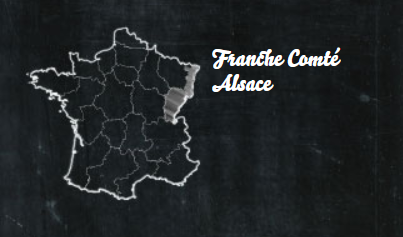French Emmental

Origin
French Emmental is a modern cheese with ancient roots and often mistaken for Gruyère. The production is characterised by the formation of holes, the “eyes”, by fermentation and a high calcium content.
The mountain dwellers in the Vosges, Franche-Comté and Savoy produced this great cheese since the Middle Ages with milk from the summer pastures in copper tanks of 1000 liters. The word “Emmental” comes from “Emme” a Swiss river, and “Tal” which means valley in German.
Characteristics
- Semi-hard cheese.
- 45% fat in dry matter.
- Round form that weighs up to 130 kg, with a diameter of between 70cm to 1 meter and a height of 13 to 25 cm.
- It has an ivory to pale yellow colour and has holes with a diameter of 1.5-3 cm. The rind is hard, dry and golden.
- Production: 260,000 tonnes per year.
Gastronomie
Emmental is the king of culinary preparations thanks to its excellent melting properties and will compliment a variety of dishes: pasta bakes, fondue, gratins, soufflés, pies etc.
Production
The curd is centrifuged to allow separation of the whey, and then heated for 90 minutes at 53°C max. Then it is matured in a cold cellar of 6-10°C, where the natural bacteria in the cheese convert the oxygen in carbon dioxide. The cheese then continues to ripen in warm cellars of 21-23 °C, it is here that its characteristic “holes” begin to develop. The heat dries the rind making it hard and waterproof which keeps the carbon dioxide trapped inside the cheese.
With an original instrument, one can check whether the cheese is aging correctly: the hammer, with which one can ‘play’, the cheese provides information about the development of the holes. It is also an instrument for taking a sample, with a cutting edge, which serves to confirm the flavor and texture form. A red label casein on the rind ensures the quality (place of production, fat percentage, registration number of the manufacturer). The Emmental de Savoie has a regional brand (red mark on the side).
Production Area
French Emmental originally derived from the Vosges, Franche-Comté and Savoy. The production area was gradually extended to the Loire and Brittany. The Union of manufacturers and producers of traditional Emmental created the collective brand “Grand cru”, which has the Label Rouge since 1979.